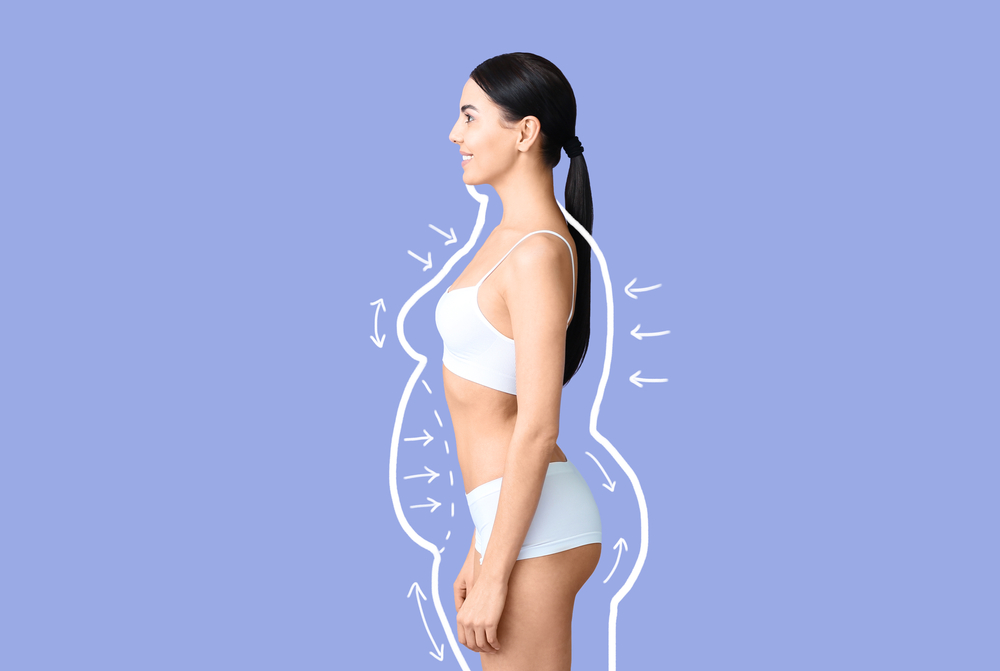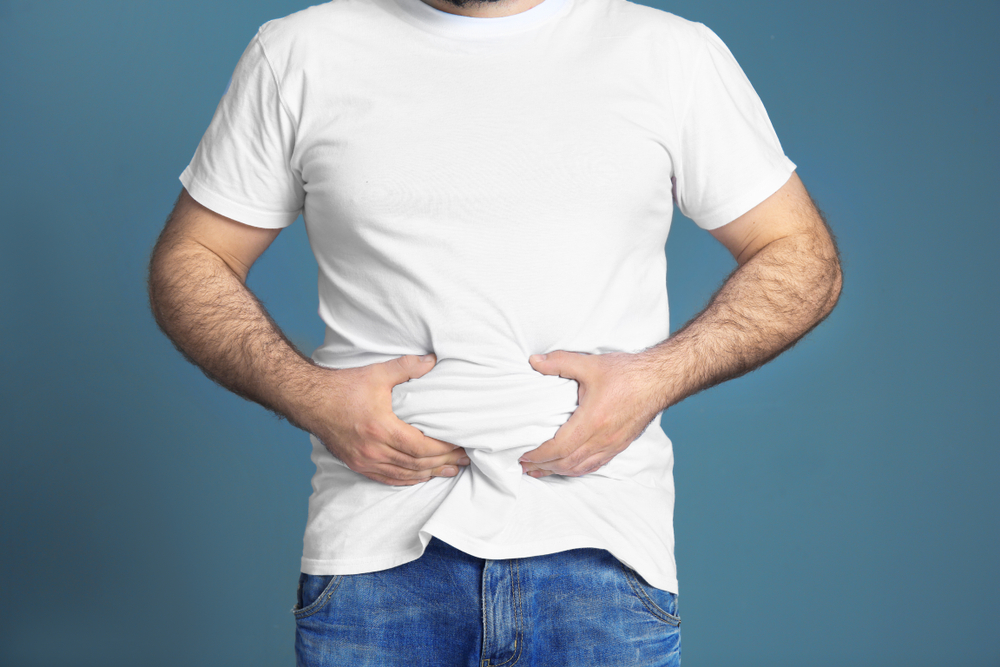An Expert’s Guide on Ways to Lose Body Fat Healthily
All of us at some point have tried to figure out ways to lose body fat without jeopardizing our health. Here’s our detailed guide on a successful and sustainable fat loss journey.

When it comes to healthy living, losing body fat tends to take center stage. Looking up ways to lose body fat may yield the same cliched results like following a specific diet and exercise, but there is more to it. Each person may have a different percentage of body fat that they may need to maintain to have a fit body. You may want to jump the gun and try diets, rigorous workouts or even medication to get rid of that stubborn body fat. But first, it may be important to understand whether losing the fat would actually lead to a healthy body.
Each one of us requires a certain amount of body fat in order to sustain. So having zero fat is never the ideal. At the same time, having high levels of body fat has been associated with various health issues like diabetes, blood pressure, etc (1). It is also important that you find a sustainable way to reduce and maintain your ideal body fat percentage. “Some areas of fat depend on your DNA. Hence, it may be easy for some people, and harder for others to lose weight in certain places. This is inherited,” says Dr. Allen Conrad, a chiropractor and owner of the Montgomery County Chiropractic Center.
Talking about why sustainable fat reduction is important, our contributor Isaac Robertson, Fitness trainer and CEO of Total Shape, says, “Quick fixes and crash diets might give you temporary results, but they rarely last. Sustainable fat reduction involves making long-term lifestyle changes. It's about finding a balance between healthy eating and regular exercise that you can maintain for the long haul. This approach ensures that you not only lose the weight but also keep it off, which is vital for your overall health and well-being.”
This article may help start your journey towards having a sustainable way to lose body fat.
Why Is Body Fat Important?

While most of us may associate fat with being a negative thing, it’s essential to know that there are different types of fat. You may not want to lose some of the good fats that are actually key to having a healthy body and mind. For sustenance, your body requires a certain amount of fat which helps cell growth and provides energy. You may want to consult an expert and calculate your ideal fat percentage before setting out to lose the fat. The good fats in your body play an important role in insulin production, hormone regulation, temperature regulation and much more (2).
While having excessive body fat can be problematic, too less body fat can be equally dangerous. Having low body fat, which may not meet the essential requirements can hamper the regulatory functions, and proper absorption of vitamins and minerals in your body (3). There are general guidelines available for men and women to understand their required fat percentage. According to these guidelines, the healthy level of fat for men would be between 2% - 24%, while more than 25% may be considered obese. In terms of women, the essential body fat percentage lies between 10% to 13%, the healthy amount lies between 10% to 31% and above 33% would be considered obese. This clearly shows us that there is a range of fat percentage that is acceptable and necessary (4).
Who Shouldn’t Try to Lose Body Fat
People may have significant weight gain during pregnancy. It is a natural process which is required for the fetus to be well nourished and the body to sustain. Trying to lose weight during pregnancy is a no-no. It may not be safe to do so unless you have a high BMI and are being guided by a doctor in the process (5), (6). Losing weight during pregnancy can in fact affect the growth and nutrition for the fetus.
People who may be immunocompromised or are experiencing malnutrition must always seek medical advice before trying to reduce body fat. “Body fat is the body's way to preserve food storages. You can monitor the calorie intake, but overall it's related to your DNA and you may be prone to weight gain if it's consistent in your family structure,” continues Conrad. Some individuals who are malnourished may still have excess body fat due to imbalanced diets that provide excessive calories from unhealthy sources, even though they lack essential vitamins, minerals, and other nutrients. This situation is often referred to as "hidden hunger" or "overnutrition."
Maintaining healthy weight is also important for older adults. As you grow older the body composition changes; your weightloss journey may be very different from people below 50. Recent research has shown that excessive loss of weight can increase the risks of mortality in older adults (7). If you have any health issues or medical conditions, it's also recommended that you consult a medical professional before setting out to reduce fat.
When It’s Safe to Try to Reduce Body Fat
Before starting your weight loss journey, it may be important to have a complete understanding of your body and health status. If you do not fall into any of the conditions mentioned above or have any chronic illnesses, it may be okay to consult a health professional and start the process. If your fat percentage exceeds the healthy portion, it may be safe to start a fat burn program.
Starting an effective and sustainable weight loss program may be a brilliant first step, especially if you have high levels of cholesterol and triglycerides.
We may be keen to shed those extra pounds hurriedly, but having a steady and gradual weight loss is the healthy way to go. The ideal way is to look at a steady weight loss over weeks rather than crash diets. Research has found that when there is a fluctuation in weight, people tend to lose less weight overall (8). This promotes fat burn and reduction in body fat percentage.
It may also be important to bear in mind that weight loss may not equal fat loss. Your weight on the weighing scale includes skeletal mass, blood volume, organ weight, lean muscle mass, etc. So there may be a chance that you have reduced the fat percentage but may see the same weight on your weighing scale.
15 Ways to Lose Body Fat
Know that weight loss is a journey that requires consistency, hard work, patience, and body positivity. Here are some ways to lose fat and get healthy!
1. Strength Training
When it comes to losing body fat, exercise is key. Strength training can work miraculously to gain muscle while wedding the excess fat in your body. While everyone may suggest only diets or cardio, strength training can be an effective way to shed fat even without extreme diets (9). So pick up some weights and optimize your fat loss.
2. Get Sleep
Sleep is known to affect the success of your fat loss journey. Research has found that lack of sleep hampers metabolism hence making it harder to burn fat (10). Studies on sleep duration and body mass have also discovered that people who had at least 6 to 8 hours of sleep were more successful in losing weight compared to their sleep deprived counterparts (11). A lack of sleep is also associated with a rise in cortisol levels, which is a stress hormone. This has been closely linked to an accumulation of fat in the abdominal region. So make sure you are getting adequate sleep when trying to reduce body fat percentage (12).
3. High Protein Diet
While high protein diets may be associated only with people who are gym heavy or are bodybuilders, know that this diet may be good for you too. It helps to tone up your body as a part of your weight loss journey. Protein rich diets are helpful as they make you feel satiated thus helping you lose body fat. High amounts of protein can also reduce the production of ghrelin which is a hunger hormone. You may hence, crave fewer sweets and carbohydrates by increasing the protein content. Research found that a 25% increase of protein in diet can cut your midnight cravings to half while reducing overall cravings by 60% (13). This protein rich diet promotes metabolism thereby helping you to lose fat.
4. Increase Cardio
Alongside your diet, exercise plays a key role in losing fats in the body. Exercises that get your heart rate up like walking, running, dancing or cycling are essential for weight loss. They increase metabolism while helping you lose fat. Aerobic exercises are known to decrease belly fat and overall body fat(14), (15). Another popular way to kick up the fat loss process is through High Intensity Interval Training (HIIT). HIIT includes a cycle of shirt high intensity exercises and breaks in an alternating format. Research has shown that this method can be very effective and lead to a loss of body fat up to 28.5%, compared to steady aerobic workouts (16).
5. Include Good Fats in Your Diet
While this may sound counterintuitive, eating a certain amount of healthy fats can help to reduce fats. Instead of obsessing over a “low-fat” diet, it may help to have a diet that has healthy fats compared to saturated or “trans fats”. Monounsaturated, polyunsaturated, and healthy fats like Omega 6 and 3 rich foods fall under the umbrella of healthy fats. Some examples of “good fat” foods would be fish, coconut oil, olive oil, nuts, and avocados. Trans fats or the “bad fats” are found in deep fried foods, baked goods, margarine, etc. These are the ones we want to stay away from. The “good fats” however have been scientifically shown to help reduce fat percentage (17), (18).
6. Avoid Processed and Refined Sugar Products
Refined sugar products and obesity have a long standing relationship. Consuming excessive amounts of added sugar is linked with increased abdominal fat. So no matter how much you exercise, as long as refined sugar is a part of your diet, you may not be able to lose those love handles (19). Bread, baked goods, and packaged sweets tend to be major contributors to your diet in terms of sugar. Steering clear of these may be essential to burn the fat. These foods are empty calories and hence it’s best to keep the consumption in check when trying to lose fat.
7. Be Mindful of What You Drink
You may forget that what you drink may also contain sweeteners and sugar like fructose which contribute to belly fat (20). Our brain may not process liquid sugars the same way as food and hence you may also end up consuming more sugar in this form. Sodas, canned juices and sometimes even alcohol may contain added sugars which set you back in your journey to reduce fat percentage. It may be beneficial to drink more water and hydrate yourself instead. A study found that increased water intake is linked with increased lipolysis and may reduce the growth of new fat cells (21).
8. Get Some Fiber
Including soluble fiber in your diet is always a good idea. It may help by making you feel full, leading to lower consumption of fats and carbohydrates. This in turn leads to lower body fat as you eat less (22). Fruits, vegetables, legumes, oats, and barley can be excellent sources of soluble fiber (23). Fiber also takes longer to digest and keeps you satiated. It is great at helping you reduce stubborn belly fat, which is linked to health issues like an increased risk of type 2 diabetes (24).
9. Reduce Refined Carbs
Refined or processed carbs are basically stripped off of all their vitamins, minerals, and fiber making them almost empty carbs. The biggest example of this is refined wheat flour which is largely consumed. Studies have shown that over a period of time, the consumption of refined carbs leads to an increase in belly fat (25). You can replace refined carbs with unprocessed starchy carbs to reduce belly fat and improve metabolism. Use whole grains like barley, oats, quinoa, or buckwheat. This may help to reduce the fat percentage overall.
10. Increase NEAT
NEAT refers to Non-exercise activity thermogenesis. It basically includes the calories you burn by engaging in all your daily activities like cooking, cleaning, engaging in a hobby, etc. A sedentary lifestyle tends to lead to an accumulation of body fat and weight gain. Thermogenesis is the process by which the body produces energy or heat and hence helps to burn fat even when doing daily activities and household chores. Research has shown that low levels of NEAt have been associated with obesity (26).
Sharing his thoughts about sedentary lifestyle, our contributor Isaac Robertson says, “You see, when you work out, you burn calories and build muscle. That's fantastic for your overall health and fitness. However, if you're leading a sedentary lifestyle outside of your workouts and not paying attention to your diet, you can easily consume more calories than you burn. It's like trying to bail out a sinking boat with a small bucket while someone else is poking holes in it. Exercise alone won't compensate for prolonged periods of inactivity and unhealthy eating habits.” Hence it is advised to engage in an activity even during your chores rather than having a sedentary lifestyle when trying to lose fat.
11. Eat Probiotics
Probiotics are essentially bacteria that are present in certain foods and help with digestion, improving the immune system and gut health (27). These probiotics seem to have been great contributors to losing fat. They are known to increase your fat burning capacity and help with long term weight management (28). Taking small doses of foods that are rich in these probiotics may help your fat loss journey while giving you better gut health. Such foods include, kefir, yogurt, kombucha, sauerkraut and kimchi.
12. Increase Iron Intake
Iron is an essential mineral that the body requires in order to produce healthy blood cells. It also plays a role in delivering oxygen to your cells. In terms of fat loss, the more oxygen your cells receive the more fat oxidation can take place and you are able to break down more fatty acids. Some of the best sources of iron can be spinach, shellfish and beans.
13. Drink Coffee
Well, good news for all the coffee lovers- coffee can actually aid weight loss! The caffeine in your coffee stimulates the central nervous system and impacts metabolism which helps break down fatty acids (29). Make sure to avoid adding sweeteners in your coffee as coffee itself has 0 calories. It is also known to be a great pre-workout drink.
14. Consuming Vinegar
Vinegar has been used for medicinal purposes for years. It helps to manage blood sugar levels and promotes fat burning in your body (30). You can use apple cider vinegar or even use vinegar as a dressing in your salads. Research has shown that having even 2 tablespoons of vinegar daily was able to help in reducing belly fat and body weight in 12 weeks (31).
15. Intermittent Fasting
You may have heard of intermittent fasting in recent times. It has been an effective weight loss method that has helped quite a few people. It follows a pattern of cyclic fasting and eating at specific times (32). You may see a pattern of 16 hours of fasting and then eating between the 8 hour period. Research has also found that intermittent fasting combined with protein pacing led to higher fat loss and reduction in weight compared to just restricted calorie diets (33).

Conclusion
At some point in your life, you may start wondering on ways to lose fat. This can be an extremely cumbersome and exhausting journey when we are not well informed. It may be important to consider your genetic makeup, diet, exercise, and other health conditions before starting your weight loss journey. These factors significantly determine your ideal fat percentage and the effectiveness of your fat loss program. You may have to give equal importance to lifestyle changes in terms of your sleep, food, and workout in general. Know that there are no shortcuts to this process and patience is key. Employing some of the strategies in this article may help you, in the long run, to sustainably lose fat and be healthy.
Contributor: Isaac Robertson, Fitness Trainer and Nutritionist - Total Shape LLC
- The role of fatty acids in insulin resistance - PMC (nih.gov)
- Body Fat | The Nutrition Source | Harvard T.H. Chan School of Public Health
- What to do if you are underweight | healthdirect
- Body weight control and energy expenditure - Clinical Nutrition Experimental (clinicalnutritionopenscience.com)
- Fit for Two: Tips for Pregnancy (aahealth.org)
- Weight Gain During Pregnancy | ACOG
- Associations of Change in Body Size With All-Cause and Cause-Specific Mortality Among Healthy Older Adults | Geriatrics | JAMA Network Open | JAMA Network
- Variability in Weight Change Early in Behavioral Weight Loss Treatment: Theoretical and Clinical Implications - Feig - 2017 - Obesity - Wiley Online Library
- The Effect of Resistance Training in Healthy Adults on Body Fat Percentage, Fat Mass and Visceral Fat: A Systematic Review and Meta-Analysis | SpringerLink
- Nihms595693.pdf
- Sleep Duration and Body Mass Index in a Rural Population | Sleep Medicine | JAMA Internal Medicine | JAMA Network
- Sleep Deprivation and Deficiency - What Are Sleep Deprivation and Deficiency? | NHLBI, NIH
- The effects of consuming frequent, higher protein meals on appetite and satiety during weight loss in overweight/obese men - PubMed (nih.gov)
- Effects of aerobic and resistance training on abdominal fat, apolipoproteins and high-sensitivity C-reactive protein in adolescents with obesity: the HEARTY randomized clinical trial - PubMed (nih.gov)
- Effects of aerobic training, resistance training, or both on percentage body fat and cardiometabolic risk markers in obese adolescents: the healthy eating aerobic and resistance training in youth randomized clinical trial - PubMed (nih.gov)
- Is interval training the magic bullet for fat loss? A systematic review and meta-analysis comparing moderate-intensity continuous training with high-intensity interval training (HIIT) - PubMed (nih.gov)
- Systematic Review of the Mediterranean Diet for Long-Term Weight Loss - PubMed (nih.gov)
- [Olive Oil and Body Weight. Systematic Review and Meta-Analysis of Randomized Controlled Trials] - PubMed (nih.gov)
- Fructose Consumption: Considerations for Future Research on Its Effects on Adipose Distribution, Lipid Metabolism, and Insulin Sensitivity in Humans - PMC (nih.gov)
- Sugar-sweetened beverages consumption is associated with abdominal obesity risk in diabetic patients - PubMed (nih.gov)
- Increased Hydration Can Be Associated with Weight Loss - PMC (nih.gov)
- The Role of Fiber in Energy Balance - PubMed (nih.gov)
- High Fiber Diet - StatPearls - NCBI Bookshelf (nih.gov)
- role of viscous fiber for weight loss: food for thought and gut bacteria | The American Journal of Clinical Nutrition | Oxford Academic (oup.com)
- A refined high carbohydrate diet is associated with changes in the serotonin pathway and visceral obesity - PubMed (nih.gov)
- Non-exercise activity thermogenesis (NEAT): a component of total daily energy expenditure - PMC (nih.gov)
- Probiotics: What You Need To Know | NCCIH (nih.gov)
- Effects of probiotics on body weight, body mass index, fat mass and fat percentage in subjects with overweight or obesity: a systematic review and meta-analysis of randomized controlled trials - PubMed (nih.gov)
- https://pubmed.ncbi.nlm.nih.gov/27824614/
- Vinegar Consumption Increases Insulin-Stimulated Glucose Uptake by the Forearm Muscle in Humans with Type 2 Diabetes (hindawi.com)
- Beneficial effects of Apple Cider Vinegar on weight management, Visceral Adiposity Index and lipid profile in overweight or obese subjects receiving restricted calorie diet: A randomized clinical trial - ScienceDirect
- https://pubmed.ncbi.nlm.nih.gov/21410865/
- Intermittent fasting and protein pacing are superior to caloric restriction for weight and visceral fat loss - PubMed (nih.gov)





 JOIN OUR WHATSAPP CHANNEL
JOIN OUR WHATSAPP CHANNEL



































































































